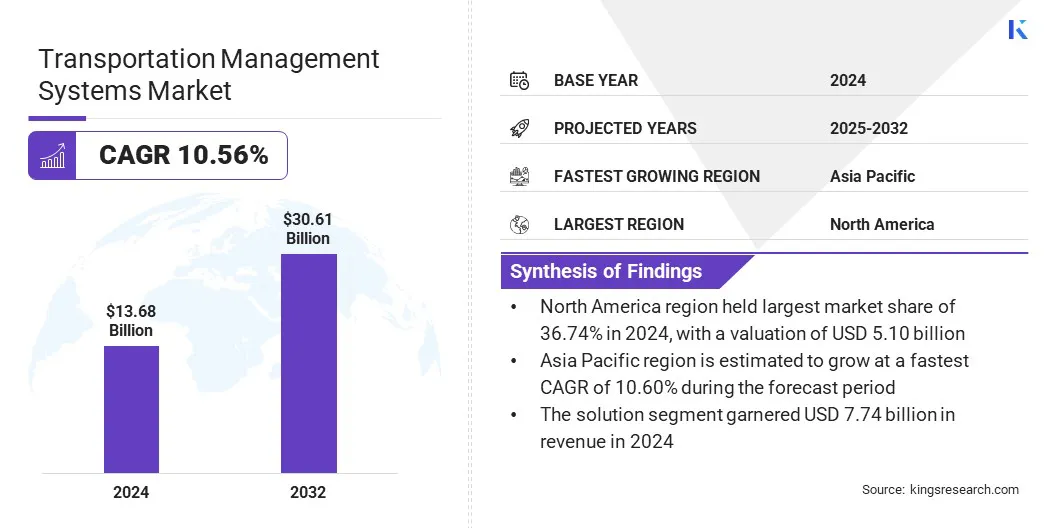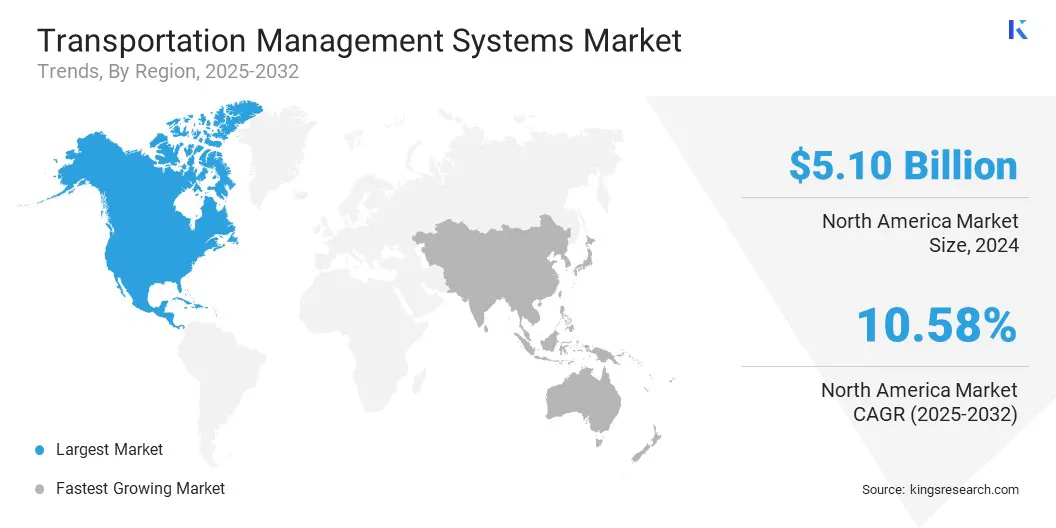Market Definition
The transportation management systems (TMS) market involves software solutions that assist businesses in planning, executing, and optimizing the movement of goods across transportation networks. TMS aims to streamline operations, reduce costs, improve efficiency, and ensure on-time deliveries. It includes functionalities like route planning, freight management, and shipment tracking to enhance overall supply chain performance and logistics management.
Transportation Management Systems Market Overview
The global transportation management systems market size was valued at USD 13.88 billion in 2024 and is projected to grow from USD 15.16 billion in 2025 to USD 30.61 billion by 2032, exhibiting a CAGR of 10.56% during the forecast period.
The growth is attributed to the rapid expansion of e-commerce, which has increased the need for efficient logistics and delivery solutions, driving the adoption of TMS to optimize routing and streamline operations.
Key Highlights:
- The global transportation management systems market size was recorded at USD 13.88 billion in 2024.
- The market is projected to grow at a CAGR of 10.56% from 2025 to 2032.
- North America held a market share of 36.74% in 2024, with a valuation of USD 5.10 billion.
- The solution segment garnered USD 7.74 billion in revenue in 2024.
- The on-premises segment is expected to reach USD 15.61 billion by 2032.
- The roadway segment secured the largest revenue share of 36.80% in 2024.
- The healthcare is poised for a robust CAGR of 10.63% through the forecast period.
- Asia Pacific is anticipated to grow at a CAGR of 10.60% during the forecast period.
Major companies operating in the global transportation management systems market are e2open, LLC, Cargobase, GoComet Solutions Pte Limited, 3Gtms, LLC, Infor, Blue Yonder Group, Inc, Manhattan Associates, Körber AG (MercuryGate), Oracle, SAP SE, The Descartes Systems Group Inc, Trimble, CTSI-Global, C.H. Robinson Worldwide, Inc., and Alpega Group.
 The market is increasingly becoming a cornerstone of modern supply chain management, as businesses focus on enhancing their logistics and operational efficiency. TMS platforms evolve to offer more integrated, user-friendly capabilities as the demand for faster, cost-effective solutions grows.
The market is increasingly becoming a cornerstone of modern supply chain management, as businesses focus on enhancing their logistics and operational efficiency. TMS platforms evolve to offer more integrated, user-friendly capabilities as the demand for faster, cost-effective solutions grows.
These systems are essential in optimizing transportation networks, providing end-to-end visibility, and helping companies to stay competitive by enabling smarter decision-making and better control over their transportation processes.
- In July 2024, Cart.com launched Constellation WMS and Constellation TMS as standalone offerings, enhancing their suite of unified commerce solutions. These systems, alongside Constellation OMS, provide powerful, scalable tools for warehouse and transportation management, driving efficiency, cost savings, and seamless integration across operations.
Market Driver
E-commerce Expansion
The expansion of e-commerce has significantly increased the demand for efficient logistics and fast, reliable deliveries, driving the need for robust TMS.
- The International Trade Administration (ITA) forecasts a consistent compound annual growth rate (CAGR) of 14.4% for the global B2C e-commerce market through 2027. Similarly, the global B2B e-commerce market is expected to grow at a CAGR of 14.5% through 2026.
As online shopping continues to grow, businesses are streamlining their supply chains to meet rising customer expectations for timely deliveries, real-time tracking, and accurate order fulfillment. Transportation Management Systems (TMS) solutions play a vital role by optimizing routing, managing freight operations, and enhancing visibility across the transportation network. This ensures cost efficiency and reliable, on-time delivery performance.
Moreover, with the rise in direct-to-consumer (D2C) orders and cross-border shipping, TMS systems have become essential for handling the complexities of modern e-commerce logistics.
- In March 2024, GEODIS launched its multi-carrier parcel shipping solution to optimize e-commerce fulfillment, offering direct carrier connections and cloud-based integration with warehouse management systems. This solution enhances rate shopping, improves delivery performance, and streamlines global parcel shipments for customers.
Market Challenge
Integration Complexity
Integration complexity remains a significant challenge in the transportation management systems market, as businesses often face difficulties in connecting TMS platforms with legacy infrastructure and diverse software environments. In response, TMS providers are increasingly offering API-driven, modular solutions designed for easier interoperability.
Many vendors are also developing customizable platforms that align with specific industry needs, reducing friction during implementation. Additionally, manufacturers are partnering with experienced system integrators to streamline deployment and ensure compatibility with existing enterprise systems, helping minimize disruptions during the transition.
- In September 2024, Trimble launched Transporeon Visibility in North America, offering real-time shipment tracking and AI-powered ETA predictions across road, ocean, and air transportation sectors. This solution enhances visibility, reduces delays, and integrates seamlessly with Trimble TMS, optimizing freight management and improving operational efficiency for carriers and shippers.
Market Trend
Rising Integration of AI and ML
A key trend in the transportation management systems market is the integration of artificial intelligence (AI) and machine learning (ML). These technologies are increasingly being adopted to enhance predictive analytics, optimize routes, and improve decision-making.
TMS can analyze vast amounts of data in real time, enabling businesses to forecast potential disruptions, reduce inefficiencies, and improve overall transportation planning by leveraging AI and ML. This trend helps companies streamline operations, lower costs, and enhance customer service by providing more accurate, data-driven insights.
- In April 2024, Umovity and Derq launched an AI-powered traffic management solution that integrates real-time analytics to enhance safety and traffic operations. This trend reflects the broader adoption of AI in transportation systems, similar to AI's role in optimizing route planning and decision-making within the market.
Transportation Management Systems Market Report Snapshot
|
Segmentation
|
Details
|
|
By Component
|
Solution (Operational Planning, Order Management, Audits & Payment, Monitoring & Tracking, Analytics & Reporting), Services (Managed, Professional)
|
|
By Deployment
|
Cloud-based, On-Premises
|
|
By Transportation
|
Roadway, Railway, Airway, Maritime
|
|
By Vertical
|
Retail & E-commerce, Healthcare, Logistics, Manufacturing, Government
|
|
By Region
|
North America: U.S., Canada, Mexico
|
|
Europe: France, UK, Spain, Germany, Italy, Russia, Rest of Europe
|
|
Asia-Pacific: China, Japan, India, Australia, ASEAN, South Korea, Rest of Asia-Pacific
|
|
Middle East & Africa: Turkey, U.A.E., Saudi Arabia, South Africa, Rest of Middle East & Africa
|
|
South America: Brazil, Argentina, Rest of South America
|
Market Segmentation:
- By Component (Solution, and Services): The solution segment earned USD 7.74 billion in 2024 due to increasing adoption of advanced TMS solutions, helping businesses optimize transportation routes, reduce costs, and improve delivery efficiency.
- By Deployment (Cloud-based, and On-Premises): The on-premises segment held 51.08% of the market in 2024, due to the preference of businesses for greater control over their infrastructure and data security within their own premises, especially in large-scale operations.
- By Transportation (Roadway, Railway, Airway and Maritime): The roadway segment is projected to reach USD 11.26 billion by 2032, owing to the growing demand for road-based logistics, real-time tracking, and route optimization, driven by e-commerce expansion.
- By Vertical (Retail & E-commerce, Healthcare, Logistics, Manufacturing, and Government): The manufacturing segment earned USD 4.33 billion in 2024 due to its high-volume, multi-modal shipping needs that require efficient route planning, cost control, and end-to-end supply chain visibility.
Transportation Management Systems Market Regional Analysis
Based on region, the market has been classified into North America, Europe, Asia Pacific, Middle East & Africa, and South America.
 North America transportation management systems market share stood around 36.74% in 2024 in the global market, with a valuation of USD 5.10 billion. North America remains the most dominant region in the transportation management systems market, due to its advanced infrastructure, high adoption of technology, and the presence of major logistics players.
North America transportation management systems market share stood around 36.74% in 2024 in the global market, with a valuation of USD 5.10 billion. North America remains the most dominant region in the transportation management systems market, due to its advanced infrastructure, high adoption of technology, and the presence of major logistics players.
The region benefits from a well-developed supply chain ecosystem, widespread e-commerce growth, and a strong focus on operational efficiency. Additionally, the region is known for investing in cloud-based TMS solutions and AI-driven technologies to streamline transportation management, reduce costs, and improve customer satisfaction, reinforcing the region’s leadership in the market.
Asia Pacific is poised to grow at a significant growth at a robust CAGR of 10.60% over the forecast period fueled by expanding economies, rapid digital transformation, and increasing logistics complexity. The region's shift toward advanced technologies, such as AI and cloud solutions, is driving the demand for more efficient transportation management.
Additionally, the rise in cross-border trade, expanding infrastructure, and greater investment in smart logistics are contributing to the accelerated adoption of TMS, positioning Asia Pacific as a key growth hub for the market.
- In February 2024, J&T Express highlighted its strong growth during the Lunar New Year, leveraging its extensive Southeast Asian network. By upgrading fleets and enhancing operational capabilities, the company showcased improved delivery efficiency, aligning with the growing demand in the market.
Regulatory Frameworks
- In the U.S., the Federal Motor Carrier Safety Administration (FMCSA) under the Department of Transportation ensures safety in motor carrier operations through strong enforcement of safety regulations, targeting high-risk carriers and commercial motor vehicle drivers, improving safety information systems and commercial motor vehicle technologies, strengthening commercial motor vehicle equipment and operating standards, and increasing safety awareness.
- The General Data Protection Regulation (GDPR) sets out detailed requirements for companies and organisations on collecting, storing and managing personal data. It applies both to European organisations that process personal data of individuals in the EU, and to organisations outside the EU that target people living in the EU.
- In the UAE, the Federal Customs Authority deals with customs affairs and shall be responsible for customs policymaking along with preparing unified legislations for organizing customs work and anti-customs smuggling and fraud.
Competitive Landscape
The transportation management systems industry is characterized by a large number of participants, including both established corporations and rising organizations. Acquisitions in the market are becoming increasingly common as companies aim to expand their technological capabilities, enhance service offerings, and strengthen their market position.
These strategic acquisitions allow businesses to integrate advanced solutions, improve operational efficiency, and meet the growing demand for more sophisticated transportation management systems.
- In September 2024, AMCS's acquisition of Qv21 Technologies enhances its fleet management and logistics capabilities, enabling further integration of TMS solutions. This strategic move allows AMCS to provide more efficient, sustainable, and data-driven solutions for bulk commodity transportation and logistics management.
Key Companies in Transportation Management Systems Market:
- e2open, LLC
- Cargobase
- GoComet Solutions Pte Limited
- 3Gtms, LLC
- Infor
- Blue Yonder Group, Inc
- Manhattan Associates
- Körber AG (MercuryGate)
- Oracle
- SAP SE
- The Descartes Systems Group Inc
- Trimble
- CTSI-Global
- Robinson Worldwide, Inc.
- Alpega Group
Recent Developments (Launch/M&A)
- In October 2024, C.H. Robinson advanced logistics efficiency by automating over 10,000 routine email-based transactions daily. This generative AI technology accelerates freight processes, improving response time, reducing manual tasks, and offering faster, cost-effective solutions to customers.
- In August 2024, Blue Yonder finalized its acquisition of One Network Enterprises for USD 839 million, enabling customers to collaborate and share real-time data across supply chains. This integration enhances visibility, agility, and decision-making through AI-driven insights, optimizing resources and addressing market disruptions effectively.
- In March 2024, Ocean State Job Lot selected Manhattan Active Transportation Management to enhance logistics planning and execution. This shift to a cloud-native TMS will optimize transportation networks, improve visibility, reduce costs, and help unify OSJL’s supply chain operations for greater efficiency.
- In February 2024, Oracle introduced new logistics capabilities within its Fusion Cloud SCM, enhancing Oracle Transportation Management. These updates aim to optimize logistics operations, improve visibility, reduce costs, automate compliance, and support decision-making to address ongoing global supply chain challenges.


